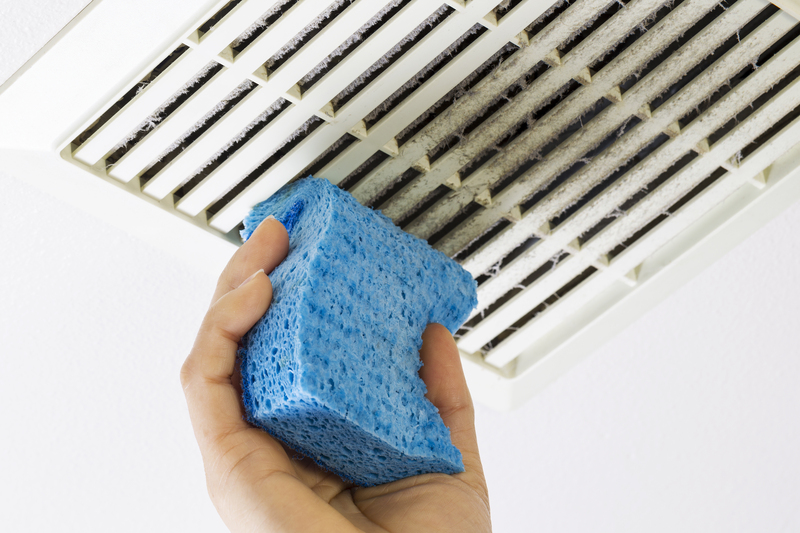Ensure an Inviting Home by Ditching Pet Odors
Posted on 13/09/2025
Ensure an Inviting Home by Ditching Pet Odors
Pets bring incredible joy, companionship, and warmth to our homes. However, sharing our lives with furry friends sometimes comes at the expense of a fresh-smelling home. Pet odors--whether from cats, dogs, or other animals--can linger and become a challenge for even the most diligent pet owner. If you are determined to ensure an inviting home by ditching pet odors, this guide offers everything you need to know.
Understanding the Sources of Pet Odor
Before discussing solutions, it's important to identify the causes of pet odors. Knowing the source allows you to address the root of the problem rather than just masking it.
- Pet Dander: Tiny flakes of skin shed by pets that can have a distinct smell.
- Urine: Especially problematic for cats and older dogs due to scent-marking habits or accidents.
- Saliva: Pets often lick surfaces, transferring bacteria and odor.
- Fur: Trapped dirt and oils in fur can become pungent over time.
- Litter Boxes & Cages: Regular cleaning is necessary to prevent odor buildup.
- Pet Bedding: Beds and blankets can quickly absorb pet smells.

How Pet Odors Affect Your Home's Atmosphere
Odors can have a profound impact on your home environment. Strong pet smells may make your home less welcoming to visitors and can linger in fabrics, carpets, and upholstery. They also may indicate underlying hygiene or health issues for your pets. A home that smells fresh and clean is more comfortable for everyone--human and animal alike.
Comprehensive Cleaning Strategies for Ditching Pet Smells
Eliminating pet odors begins with an effective, consistent cleaning routine. If your goal is to ensure your home is inviting by saying goodbye to pet odors, consider these cleaning strategies:
1. Regular Grooming is Essential
- Bathe Your Pets: Depending on the breed and activity level, keep your pet's coat clean with a bath every few weeks.
- Brush Frequently: Regular brushing removes dander, loose fur, and dirt, reducing odor and shedding.
- Maintain Ears and Teeth: Oral odors and ear infections can add to bad smells--clean ears and teeth regularly.
2. Stay on Top of Litter Boxes and Kennels
- Scoop Litter Daily: Infrequent scooping is the primary source of cat odor. Consider using clumping or odor-control litters.
- Replace Litter Regularly: Completely change and wash the box at least once a week.
- Clean Cages and Kennels: Wash cage trays and kennel floors weekly with pet-safe disinfectant.
3. Wash Pet Bedding and Toys
- Launder Weekly: Wash beds, blankets, and toys in hot water with pet-safe detergents.
- Consider Machine-Washable Gear: Choose bedding and toys that are easy to clean to reduce lingering smells.
4. Clean Pet-Used Upholstery and Carpets
- Vacuum Regularly: Use a vacuum with a HEPA filter to trap dander and pet hair.
- Steam Clean Monthly: Steam cleaning carpets and upholstery helps eliminate embedded pet odors.
- Spot Clean Accidents: Use enzyme-based cleaners to break down urine and organic messes thoroughly.
Natural Methods to Combat Pet Odors
For those who prefer natural cleaning options, there are safe and simple ways to eliminate pet odors naturally:
- Baking Soda: Sprinkle on carpets and pet beds; let sit and then vacuum--baking soda neutralizes odors.
- White Vinegar: Mix with water for a spray that disinfects and deodorizes hard surfaces.
- Lemon Juice: Excellent for removing musty smells; add to cleaning solutions.
- Activated Charcoal: Place sachets around your home to absorb stubborn odors.
- Essential Oils: A few drops of lavender or eucalyptus (pet-safe amounts) can freshen the air. Be cautious--some oils can be toxic to pets.
Addressing Specific Pet Odor Issues
Sometimes, you may encounter persistent or specific pet odor problems. Here are targeted solutions for common situations:
How to Get Rid of Dog Odor in the House
- Frequent Baths: Use deodorizers designed for dogs.
- Wash Dog Collars: Collars often hold onto smells and need washing too!
- Professional Grooming: Schedule regular trims and deep-cleans for long-haired dogs or heavy shedders.
How to Remove Cat Urine Smell from Your Home
- Act Quickly: Blot urine immediately; don't scrub as it spreads the stain.
- Enzyme Cleaners: These break down smell at a molecular level--perfect for stubborn urine spots.
- Blacklight Inspection: Use a UV blacklight to find hidden urine spots and treat them thoroughly.
Dealing with Small Animal Odors
- Frequent Cage Cleaning: Change bedding and wash cages every few days, depending on the pet.
- Upgrade Bedding: Choose high-absorbency, odor-control bedding materials.
- Proper Diet: Poor nutrition can increase smell, so feed pets a diet recommended by veterinarians.
Utilizing Air Purification to Ensure a Welcoming Home
Even with thorough cleaning, airborne pet odors can persist. To ensure an inviting and fresh atmosphere, air purification is a worthwhile investment.
- HEPA Air Purifiers: These filters capture dander, hair, and airborne odor particles.
- Activated Carbon Filters: Excellent for absorbing smells and volatile organic compounds.
- Open Windows: Regular ventilation helps keep the air fresh and reduces stagnant odors.
Prevent Future Pet Odors from Becoming a Problem
Prevention is the best strategy to maintain a consistently fresh-smelling home. Incorporate these habits to ditch pet odors before they take hold:
- Set a Cleaning Schedule: Regular routines prevent odor buildup.
- Train Your Pets: Proper house-training and behavior correction stop accidents before they start.
- Maintain Pet Health: Regular vet checkups can catch infections or health issues that cause odors.
- Choose Odor-Resistant Materials: Consider furniture with washable or odor-resistant covers.
- Protect Entryways: Place washable mats at doors for pets to wipe off paws before entering.
Products That Help Neutralize Pet Smells
There are several commercial products designed specifically to tackle and neutralize pet odors:
- Enzymatic Cleaners: Target and digest odor-causing proteins in urine, feces, and vomit.
- Odor-Eliminating Sprays: Look for products that neutralize rather than mask smells.
- Pet-Friendly Air Fresheners: Always choose options safe for animals--avoid aerosols around birds and small animals.
- Laundry Additives: Products specifically for washing pet bedding and fabrics can significantly reduce lingering scents.
Why Personal Hygiene and Health Matter in Odor Control
Sometimes, persistent pet odors can be a sign of underlying health issues--for both pets and people. For example, foul-smelling breath, chronic urinary accidents, or skin infections can indicate that your pet needs veterinary attention.
- Regular Vet Visits: Stay on top of vaccinations, deworming, and general checkups.
- Feed a Balanced Diet: Nutrition affects coat condition, digestion, and odor.
- Monitor Hygiene: Clean ears, eyes, and teeth to prevent bacterial overgrowth.
Welcoming Guests: Creating an Inviting Home Environment
There's nothing more embarrassing than welcoming guests into a home that's overwhelmed by animal smells. First impressions count--keep your home inviting with these tips:
- Pre-Visit Deep Clean: Focus on high-traffic areas, upholstery, and entryways before guests arrive.
- Use Scented Candles or Diffusers: Choose mild, pet-friendly scents to create a pleasant atmosphere.
- Air Out Your Home: Open windows and use fans to exchange indoor air.
- Keep Pets Groomed: Bathe and brush pets before entertaining to minimize shedding and odor.
Common Mistakes to Avoid When Tackling Pet Odors
If you want to ensure your home is inviting by ditching pet odors, avoid these common pitfalls:
- Masking Instead of Removing: Simply spraying air freshener won't address the underlying odor.
- Neglecting Regular Maintenance: Waiting too long between cleanings allows smells to become embedded.
- Using Harsh Chemicals: Some cleaners are unsafe for pets--always select pet-safe, non-toxic products.
- Ignoring Hard-to-Reach Areas: Remember to clean under furniture, behind curtains, and in hidden corners.

Summary: Embrace a Fresher, More Welcoming Home
Living with pets doesn't mean you have to accept lingering odors. Through regular grooming, consistent cleaning, targeted odor removal, and preventive habits, you can create an inviting, fresh-smelling home for yourself, your family, and your guests.
Adopting a proactive approach to pet odor control ensures your home remains a comfortable, welcoming refuge for all. With a little effort and the right strategies, you can eliminate pet odors and enjoy the countless benefits of life with animals--without sacrificing freshness or hospitality.
Frequently Asked Questions: Achieving a Home Free of Pet Odor
- What is the best way to keep my house from smelling like pets?
Daily cleaning routines, frequent pet grooming, and enzyme-based cleaning solutions are key. Invest in a quality air purifier for the finishing touch. - Can pet smells affect my health?
Persistent odors can signal excess bacteria, mold, or pet health issues, which could impact air quality. Always address odors quickly and consult a vet if concerned. - Are natural odor-fighting solutions effective?
Yes! Baking soda, vinegar, and lemon are effective when used safely and regularly. Always test on a small area first. - What should I do for tough, long-lasting pet odors?
Treat problem areas with enzymatic cleaners, deep steam clean soft surfaces, and replace severely affected items if necessary.
Ready to enjoy an inviting home that guests and residents--all species--will love? Ditch pet odors today and embrace a fresher tomorrow!
Latest Posts
Brighten Up Your Home: Take Charge with Our Deep Cleaning Guide
Expert Techniques for a Pristine Car Wash at Home
Combat Mold: Tips for a Cleaner Bathroom



